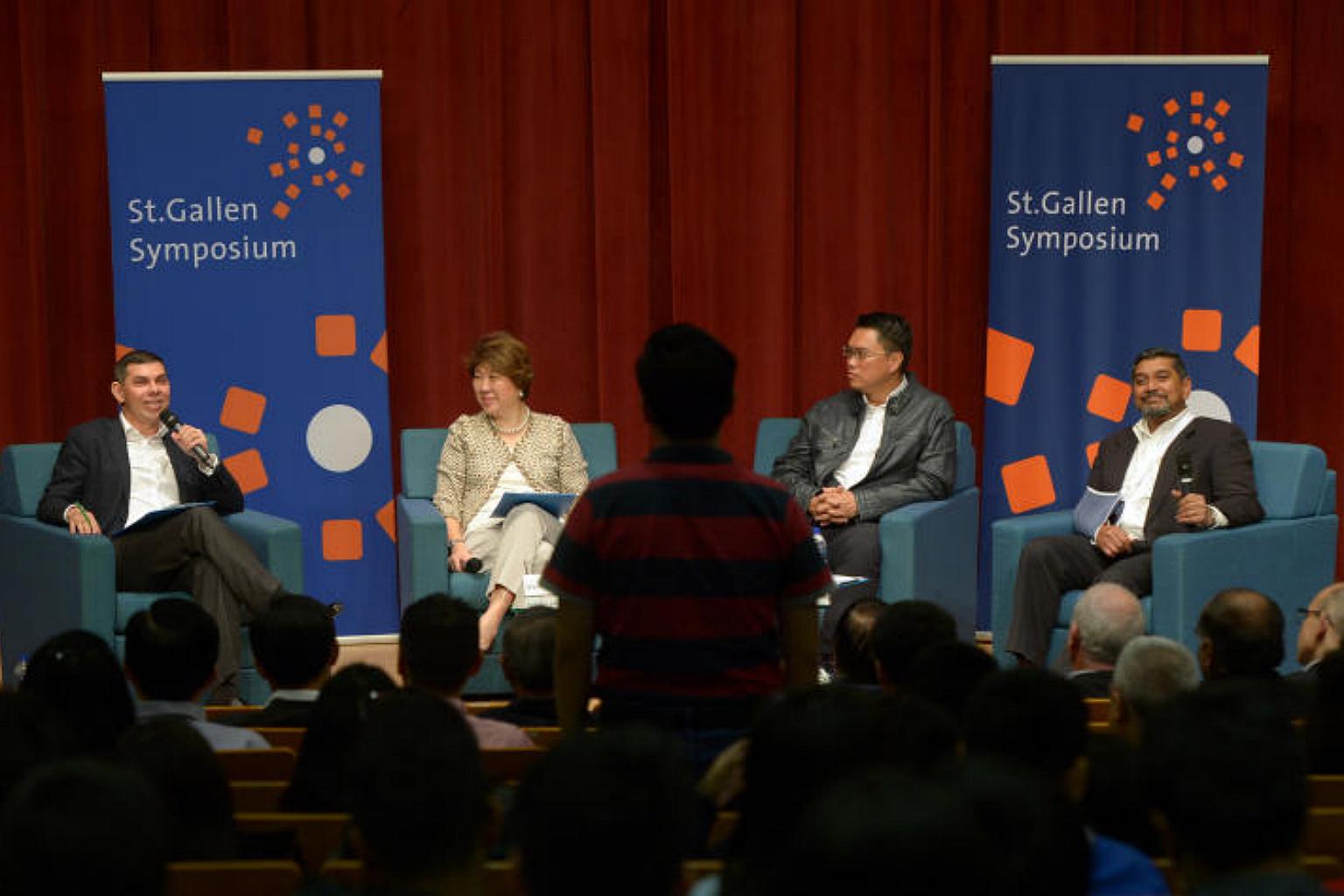University students question panel on work and education at St Gallen Symposium
Sign up now: Get ST's newsletters delivered to your inbox

Panellists (from left) Warren Fernandez, Janet Ang and Patrick Tay, with moderator Viswa Sadasivan at the St Gallen Symposium 2018 Singapore Forum panel discussion, on Jan 13, 2018.
ST PHOTO: ALPHONSUS CHERN
Ng Jun Sen
Follow topic:
SINGAPORE - What happens to low-skilled workers, especially those at the lowest rung of earners, amid Singapore's push for automation, robotics and artificial intelligence?
And what does this change mean for students when the courses or skills they learn today may become irrelevant tomorrow?
"Do I still need to study?" asked one undergraduate.
These and other questions, including how government, schools and corporations can deal with technological disruption, popped up at the St Gallen Symposium 2018 Singapore Forum at the National University of Singapore's University Town on Saturday (Jan 13).
Centred around the theme "Beyond the end of work", this was the third time it is held in Singapore. Past symposiums included Deputy Prime Ministers Mr Teo Chee Hean and Tharman Shanmugaratnam as speakers.
Saturday's keynote speaker Senior Minister of State for Education, Communications and Information Janil Puthucheary said that students and workers alike will have to adapt not only in today's industry transformation but future ones too.
Said Dr Puthucheary: "The thread that runs through all of this is that we do not want technology to be a separate applied learning subject or initiative.
"It is the process of learning about technology that we are trying to make possible, even as the programming language students pick up now can become obsolete later."
He added: "The end of work has already arrived, and the end of education as we know it may be starting."
A separate panel comprising West Coast GRC MP Patrick Tay, IBM Asia Pacific vice-president Janet Ang, and editor-in-chief of Singapore Press Holdings' English/Malay/Tamil Media Group Warren Fernandez also deep-dived into the future state of work. It was moderated by communications consultant Viswa Sadasivan.
Ms Ang said there will be problems if all bosses only want "to take care of those of the highest ranks".
"Income disparity is man-made. We should ask if the system is designed to be compassionate or not. But (for individuals), is this something we are waiting for someone else, like the government, to solve for us? Or is it something we can change by learning (new skills)?"
Mr Fernandez, editor of The Straits Times, said during a recent retrenchment exercise by his company, people who were let go were concerned about how their bills will be paid and how their time will be spent.
"Many asked what they are going to do to give them meaning in life? That is the question we should ask ourselves: What comes after work?
Referring to how technology has reshaped industries, including the media, Mr Fernandez said people are still uncertain about what jobs are available. "The most valuable education that you can have today is the broadest one, to allow your minds to be nimble," he said.
Mr Tay, the National Trades Union Congress' assistant secretary-general, said he is worried that the shared economy and the "Uber-isation" of workers today can create a new wave of low-wage earners.
Citing how his recent online purchase of virtual reality goggles for Christmas presents were delivered by Ninja Van, Mr Tay said the nature of work has changed drastically for those in the retail, manufacturing and logistic sectors. The Ninja Van driver possibly earns a slim margin of around $10 per trip, he added.
On the other hand, VR technology means new opportunities elsewhere. Bus drivers can be trained through VR today, while risky jobs on oil platforms can be performed remotely through goggles.
The Switzerland-based symposium was established in 1970 by the International Students' Committee, and holds yearly talks involving policymakers, business leaders and academia.

